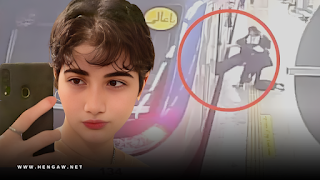Repetition of a Harsh Reality in the Lives and Deaths of Iranian Girls; Story of Kurdish Teen Armita Garavand
Repetition of a Harsh Reality in the Lives and Deaths of Iranian Girls, Story of Kurdish-Iranian Teenager Armita
By: Soraya Fallah
Over the past few days, distressing news about Armita Geravand has flooded the internet. She was a Kurdish-Iranian girl who fell into a coma on the Tehran Metro on 1 October 2023 at the young age of 16. After being held in the ICU of an Army hospital, she was declared brain dead on 22 October 2023. This tragic news immediately brought to mind the killing of Jina Mahsa Amini, making me wonder if anyone is holding the Iranian government accountable or if they are granted impunity.
I try to picture Armita's mother, likely in Kermanshah's cemetery, if allowed, trying to make sense of the senseless, surrounded by the memories and echoes of a life cut tragically short. As I delve into the news reports, my thoughts drift, picturing my hometown, the Aichi cemetery in the western Kurdish city of Saqqez. The weight of the graveyard comes to mind, reminding me of the heartbreak from the year before when Jina Mahsa was taken back there.
Learning that Armita's family was forbidden from burying her in her hometown, Kermanshah, and that the regime plans to bury her in an unmarked grave in Tehran is heartbreaking. This cruel act feels like a final blow to the already shattered hopes for justice and decency.
The details are haunting—a Kurdish-Iranian teen girl, barely older than many in my community, confronted by the morality police in Iran. Their demand for her to adjust her hijab, seemingly a simple request, escalated into a harrowing altercation. I get so angry as I read how the situation intensified, how Armita was physically assaulted, and the devastating outcome—she fell into a coma.
Tears fill my eyes as I contemplate the sheer inhumanity of it all. A young life hanging by a thread due to a mere difference in beliefs. The cruelty and oppression seep through every word in the news articles, painting a vivid picture of injustice.
In Iran, women are mandated by law to cover their hair and wear loose-fitting clothes according to strict Islamic dress codes. Violating these rules results in public rebuke, fines, or arrest by the Islamic religious police, also known as the morality police. The death of 22-year-old Jina Mahsa Amini in the custody of the morality police due to an alleged improper headscarf sparked nationwide protests, known as the "Jina Revolution/Mahsa movement." In response, the regime tightened hijab laws and suppressed activism.
The news of Armita's passing hits me hard; she went into a coma for some time after suffering from brain damage, died a few minutes ago…. Those words pierce my heart, leaving behind a deep ache of sorrow and a surge of anger. Armita, this vibrant young soul, succumbed to the brutality she experienced. The weight of it all bears down on me, emphasizing the stark contrast between my privileges and the oppression faced by Iranian girls like Armita and minorities in Iran. The conflicting reports, the coercion of families, and the government's narrative manipulation only add to my despair.
I experience a mix of emotions—outrage, sorrow, and a sense of powerlessness. The world feels far from the just and equitable place I yearn for. Yet, in my grief and helplessness, a sense of determination stirs within me. I might not be able to change the world on my own, but I can be part of the voices demanding change. I've decided to use my platform and voice to spread awareness and stand in solidarity for justice and human rights. The world needs to hear Armita's story, acknowledge the injustice, and strive for a world where tragedies like these will be nothing but a distant memory.
I close my laptop, the vivid images
and words lingering in my mind. Wiping away my tears, a mix of sorrow and
frustration, I take a deep breath. Once more the resolute promise blooms within me—to stand
for those whose voices are stifled. I find solace in the courageous work of
human rights groups and journalists such as Kurdish-Iranian Hengaw, who brought
to light the grim reality, even posting Geravand's hospitalization publicly
with photos on social media showing her unconscious and on life support, a harsh
testament to the tragedy that unfolded.
#Armita, #ArmitaGaravand #womenLifeFreedome #jinJiyanAzadi @Hengaw_English



Comments
Post a Comment